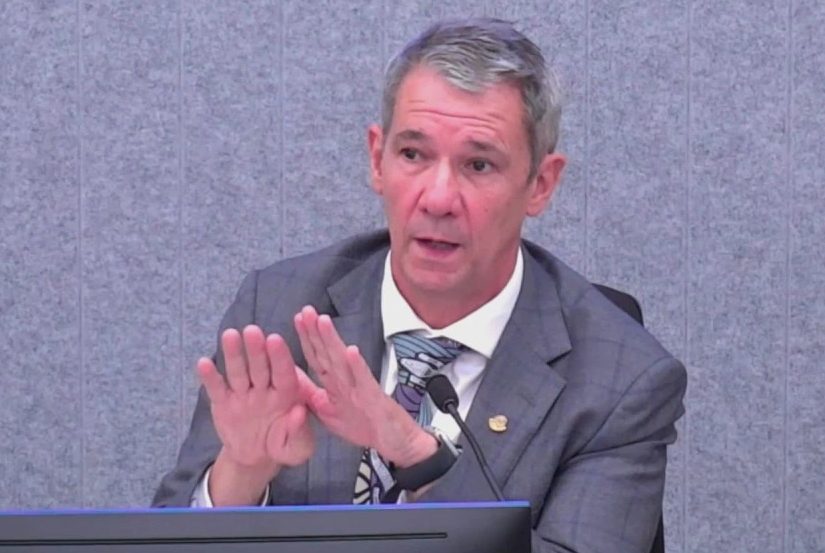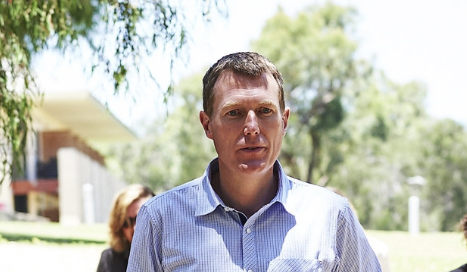
Legal affairs writer HUGH SELBY says objectivity went missing during the prosecution of the Brittany Higgins case, but it wasn’t a single-instance phenomenon. The reasons that prosecution offices go to trial or not are secret business. Save for a Sofronoff-style inquiry, there is no mechanism that forces a prosecution office to disclose their reasoning.
THE Sofronoff Inquiry exposed the ease with which our prosecution system can be abused.

It is meant to be a dispassionate process that objectively both weighs up the evidence gathered by police and considers our community interests before making a decision to go to a trial. It’s a two-part test.
Objectivity went missing during the Higgins saga. In its place critical decisions were made on other bases, wrongful bases, bases that undermine the quality of our criminal justice system. These were on parade during the Sofronoff public hearings.
The Higgins prosecution debacle is not a single-instance phenomenon. There are other examples, in the ACT and elsewhere in Australia, where cases of alleged sexual assault are taken to trial despite the lack of good evidence.
The reasons that prosecution offices go to trial or not are secret business. Save for a Sofronoff-style inquiry, there is no mechanism that forces a prosecution office to disclose their reasoning. The courts will not inquire.
The Gobbo affair in Victoria gave us another, rare insight into the inner workings of a prosecution office. The twist with this affair was that the decision was against, not for, going to trial.
Former High Court Justice Nettle recommended that charges be laid against some police involved in the “management” of defence lawyer turned police informant Nicola Gobbo.
The Victorian Director of Public Prosecutions refused to do so, contending that there was too little evidence to secure a conviction.
In the public spat there was much more information shared with the public than is usual.
Defence lawyers could only be envious of how much more information was released in the Gobbo affair than they routinely are given.
No transparency, just a veil
The failure to require an office of (the director) of public prosecutions (ODPP) to give reasons as to why it is, or is not, prosecuting assumes that their decision makers are not only skilled in the law, but also free from any interference with the claimed “objective detachment” that is necessary to make the right decision.
That assumption is false. ODPP offices are hierarchical. People want recognition and promotion. The most senior often aspire to be made judges. Those appointments are made by the government of the day, so sniffing the political breeze is essential.
ODPPs are as political and opportunistic as any other organisation. Secrecy about their processes merely ensures free rein for self-interest, misuse of public funds in running popular but hopeless cases, and bullying defendants and their lawyers. We can call that prosecutorial abuse.
Burying the public interest test
The “public interest” (our interest) is a factor when deciding to prosecute. It is not something which can be raised as a defence at trial.
The Higgins saga is an exemplar of cases being run in the absence of a sound evidential basis. It is to be distinguished from cases where there is good evidence but a wilful decision to either ignore the public interest requirement or replace it with another, improper interest, such as a cover up of other people’s mistakes.
An important rationale for our criminal justice system is to deter crime. With prosecutorial abuse the system can deter good citizens from reporting such improper conduct as administrative bullying, breaches of the rules of war, and intelligence services misconduct. The deterrent is that the good citizens who publicise such errors are not praised, but instead successfully prosecuted and sentenced.
The Commonwealth’s Prosecution Policy has the following guidelines with respect to evaluating the ‘public interest’:
2.8 Having satisfied himself or herself that the evidence is sufficient to justify… a prosecution, the prosecutor must then consider whether, in the light of the provable facts and the whole of the surrounding circumstances, the public interest requires a prosecution to be pursued. It is not the rule that all offences brought to the attention of the authorities must be prosecuted.
2.9 The factors which can properly be taken into account in deciding whether the public interest requires a prosecution will vary from case to case. While many public interest factors militate against a decision to proceed with a prosecution, there are public interest factors which operate in favour of proceeding with a prosecution…
2.10 Factors which may arise for consideration in determining whether the public interest requires a prosecution include the following non-exhaustive matters (the following selection from the lengthy list reflects the issues discussed later in this article):
(a) the seriousness or, conversely, the relative triviality of the alleged offence…;
(b) mitigating or aggravating circumstances impacting on the appropriateness or otherwise of the prosecution;
(d) the alleged offender’s antecedents and background;
(e) the passage of time since the alleged offence when taken into account with the circumstances of the alleged offence and when the offence was discovered;
(g) the effect on community harmony and public confidence in the administration of justice;
(i) whether the prosecution would be perceived as counter-productive, for example, by bringing the law into disrepute;
(k) the prevalence of the alleged offence and the need for deterrence, both personal and general;
(l) whether the consequences of any resulting conviction would be unduly harsh and oppressive;
(m) whether the alleged offence is of considerable public concern;
(p) the actual or potential harm, occasioned to an individual;
(q) the likely length and expense of a trial;
(u) the necessity to maintain public confidence in the rule of law and the administration of justice through the institutions of democratic governance including the parliament and the courts;
A transparent, properly accountable prosecution system would require the ODPP to explain why and how these factors, when applicable, were insufficient to stop a prosecution from going ahead.
No such explanation has been offered for the Commonwealth prosecutions of four whistleblowers. Publicly reported information about each case is set out below.
Readers are invited to take that information, to assume that there is sufficient evidence to prosecute, and to apply the public interest criteria to each case.
Having done that comparison you might conclude as follows about each case:
- The whistleblower, later accused, exposed significant indicators of wrongdoing by others with power and influence;
- We, the public, are entitled to the information that they shared with us;
- Our democracy benefited from these apparent wrongful acts being exposed;
- Without the whistleblower disclosures the bad practices would have continued;
- We taxpayers are funding these prosecutions that serve no apparent purpose other than to protect past and future wrongdoers from being held to account;
- These prosecutions are ruinous for the accused, not just reputationally but also financially and mentally. Since experienced prosecutors well know the costs of litigation and that no costs orders will be made against them, it is reasonable to assume that driving the accused to ruin is a calculated step; and,
- These prosecutions bring our criminal justice system into disrepute.
There is nothing legalistic about recognising “public interest”. A reader can do it as well as a High Court judge.
However, ODPP secrecy and non-accountability to the accused and the public brings to mind the telling, analogous observations by former High Court Justice Virginia Bell in her report about Prime Minister Morrison’s grab for extra ministerial responsibilities. She wrote:
- Given that the Parliament was not informed of any of the appointments, it was unable to hold Mr Morrison to account in his capacity as minister administering any of these five departments. As the Solicitor-General concluded, the principles of responsible government were “fundamentally undermined” because Mr Morrison was not “responsible” to the Parliament, and through the Parliament to the electors, for the departments he was appointed to administer.
- Finally, the lack of disclosure of the appointments to the public was apt to undermine public confidence in government. Once the appointments became known, the secrecy with which they had been surrounded was corrosive of trust in government. [https://www.ministriesinquiry.gov.au/publications/report-inquiry ]
Four case studies
Case 1: Richard Boyle, Adelaide-based public servant, worked at the ATO as a debt collector.
He chose to tell the ABC “Four Corners” program about what he saw as unfair debt-collection tactics encouraged by some in the ATO’s Adelaide office, namely to seize funds from the bank accounts of taxpayers assessed to owe the ATO money, regardless of their personal circumstances.
He raised his concerns in 2017, using the “usual” channels. Nothing happened, so he went public. “Four Corners” aired in April 2018.
In January 2019 he was charged with 66 offences (now reduced by the CDPP to 24) including using a listening device to monitor a private conversation, recording another person’s tax file number and disclosing protected information. He has said that each such activity was necessary for him to demonstrate the harmful practices.
He may, or may not, be protected by public interest disclosure laws passed in 2013, specifically relevant to public servant whistleblowers.
An SA District Court judge ruled against his claim for protection. He has lodged an appeal with the Supreme Court that is expected to be heard this year.
Meanwhile, there is telling, independent support for the value to us of his whistleblowing; that is, the public interest in no criminal proceedings, as follows:
(1) A Senate Economics Legislation Committee report noted problems with the way the ATO investigated whistleblower complaints, including Mr Boyle’s.
“…the committee is concerned that the standard of the ATO’s investigation could appear to the public to be superficial in addressing the concerns raised by ATO whistleblowers “.
(2) HIs revelations resulted in the inspector-general of taxation launching a review into garnishee notices (which compel the recipient to pay funds to the ATO).
The review dismissed the suggestions that the ATO was behind a “cash grab” from small businesses, but found the ATO did not always use its garnishee powers “proportionately and appropriately”. ( See the IGTO report, March 2019, especially the opening Executive Summary, and Appendix 13 that looks specifically at what happened in Adelaide, https://www.igt.gov.au/investigation-reports/review-into-the-australian-taxation-offices-use-of-garnishee-notices/ )
(3) Yet another review, by the Australian Small Business and Family Enterprise Ombudsman (ASBFEO) into the ATO’s debt recovery actions, found in 2019 that the ATO’s behaviour could cripple small business.
The key conclusions were: 1. that any of the “stronger” forms of debt recovery action can directly cause the failure of a small business by, for example, leaving them without funds to dispute a claimed tax debt;
- ATO debt recovery processes need to be proportionate to established facts around the debt claim, fair and consistent – an approach that was sometimes ignored; and,
- ATO’s then engagement with small business could be pointlessly time consuming and needed to improve. (This report can be obtained by emailing advocacy@asbfeo.gov.au)
Case 2: David McBride, a former Australian Army lawyer who served two tours of duty in Afghanistan in 2011 and 2013. He provided information, made public by the ABC in 2017, about war crimes in Afghanistan.
In 2018 he was charged with five offences, including the unauthorised disclosure of information, theft of Commonwealth property and three counts of breaching the Defence Act. Mr McBride is to face trial in November 2023, just a few months away.
Given the Brereton Inquiry into the conduct of some members of the ADF in Afghanistan, the subsequent appointment of former CDPP and Justice of Appeal Mark Weinberg as Special Investigator into that conduct, the recent charging of a former ADF member arising from his service in Afghanistan, and the adverse findings of Justice Besanko in Robert-Smith’s defamation action, is there a scintilla of rational, objective decision making in asserting a public interest in prosecuting Mr McBride?

Cases 3 and 4: Witness K, an Australian government employee, blew the whistle in 2013 on earlier shenanigans by other employees intended to “do over” our near north neighbours, Timor-Leste, with whom we were in negotiations about the divvying up of valuable undersea resources.
Our official conduct – an act of bastardy – destroyed whatever belief there might have been among those neighbours as to our capacity to behave with honour and with genuine commitment to building their post-colonial capacity.
Fortunately, steps were taken in the years after the exposure of our bad acts to repair the damage. Plaudits for getting that, at least, right.
No such approval though for the petty, drawn out, vengeful, “shoot-the-messenger” campaign waged against the whistleblower, Witness K. They pursued him with secret hearings from June 2018 (ie some five years after his disclosures) until he pleaded guilty, was convicted and given a three month suspended imprisonment sentence.
His crime was breaching our security laws by revealing that we secretly played dirty on foreign soil, not for reasons of our national security but to make a buck from others much less fortunate than us.
Given that what our Intelligence Service did was inexcusable, and that our government later took steps to put it right, what public interest can there be in prosecuting and punishing the person courageous enough to bring it to light?
The Albanese government inherited a second limb of this scandal, that being the prosecution of ACT lawyer Bernard Collaery, who had advised Witness K. Sensibly Attorney General Mark Dreyfus discontinued that prosecution.
By the time he took that decision there had been 59 (sic) court appearances, at all levels of the ACT courts, plus the High Court. Fortunately for Mr Collaery, a group of talented, experienced lawyers gave him their professional assistance for no fee.
Myth of Commonwealth ODPP independence
A key justification for setting up ODPP around Australia was to separate the political and criminal justice processes. Historically the attorney-general initiated bills of indictments (the formal document setting out the charges before the trial court). ODPP legislation gave those powers to the notionally independent directors who made decisions to prosecute or not to prosecute on objective, non-political criteria.
The legislation around the states, territories and Commonwealth is broadly similar; however, the extent to which the attorney-general retains rights to initiate, take over, or end a prosecution varies.
It would probably surprise many state/territory prosecutors, and those defence counsel who do little work against Commonwealth prosecutors, how much a Commonwealth attorney-general can interfere in the prosecution of Commonwealth offences.
The Commonwealth Director of Public Prosecutions Act 1983 includes the following:
The functions of the Director are:
(baa) if the Attorney-General requests the Director in writing to carry on a prosecution … that was instituted by the Attorney-General—to carry on that prosecution;
Directions and guidelines by Attorney-General
(1) In the performance of the Director’s functions and in the exercise of the Director’s powers, the Director is subject to such directions or guidelines as the Attorney-General…. gives or furnishes to the Director ….
(2) Without limiting the generality of subsection (1), directions or guidelines under that subsection may:
(a) relate to the circumstances in which the Director should institute or carry on prosecutions for offences;…
(c) be given or furnished in relation to particular cases…..
Powers of Director
(4) Where:
(a) a person is under commitment, or has been indicted, on a charge of an indictable offence …; and
(b) the prosecution for the offence was instituted, has been taken over or is being carried on by the Director;
the Director may decline to proceed further in the prosecution ….
Powers and functions of Director do not affect those of certain other persons
(1) Nothing in this Act affects:
(a) the power of the Attorney-General…. to prosecute by indictment in his or her own name indictable offences against the laws of the Commonwealth;
The Commonwealth Judiciary Act 1903 provides in section 71:
Discharge of persons committed for trial
(1) When any person is under commitment upon a charge of an indictable offence … the Attorney-General …. may decline to proceed further in the prosecution…..
(2) Nothing in subsection (1):
(a) affects the power under subsection 9(4) of the Director of Public Prosecutions Act 1983 of the Director of Public Prosecutions….

For all four cases outlined in this article Christian Porter was the attorney-general (2017 to 2021) when the decision to prosecute was made. The Director of the Commonwealth ODPP was Sarah McNaughton SC. She was appointed in May 2016. She resigned in September 2022 to become a NSW Supreme Court judge. As of July 2023 there is an acting director, Scott Bruckard. He joined the ODPP in 1987 and has apparently spent his career there.
It would be interesting to know what, if any, involvement Attorney-General Porter had in the decisions to prosecute and maintain the prosecutions for each of these cases.
How sad it is that the former director either decided to initiate these prosecutions or, if directed by Attorney-General Porter to prosecute, did not thereafter terminate them. Her current position as a judge probably entails that she cannot share her reasons with us.
Nevertheless, given the seeming lack of any “public interest” factor to support these prosecutions and the strength of the “public interest” reasons against continuing the prosecutions of Boyle and McBride, another interesting question is why they are being continued by the Labor government.
Given that the present Attorney-General, Mark Dreyfus, discontinued the prosecution of Collaery, why has he not done the same for Messrs Boyle and McBride?
Is he afraid of criticism? Surely not. The interests of public trust in our criminal justice system must be paramount. He has the time to act before the Boyle and McBride trials. Does he have the will?
There is no doubt that the disclosures made by these whistleblowers were justifiable and that we, the public, have benefited.
Their disclosures caused embarrassment to those who prefer to hide behind secrecy.
It takes courage to be a whistleblower.
The use of the criminal law to suppress, deter, and punish public-interest whistleblowing is a disgrace. It must be called out.
In her recent Robodebt Report Commissioner Catherine Holmes wrote in her preface:
It is remarkable… the lengths to which public servants were prepared to go to oblige ministers… Truly dismaying was the revelation of dishonesty and collusion to prevent the scheme’s lack of legal foundation coming to light. Equally disheartening was the ineffectiveness of what one might consider institutional checks and balances… in presenting any hindrance to the scheme’s continuance.
The essence of those observations must also apply to dispassionate prosecuting.
Let no one ignore the timeless sentiments uttered by Chief Trial Judge Dan Haywood (Spencer Tracy) in “Judgment at Nuremberg”, Stanley Kramer’s film from 1961. See the classic trailer – especially the first few “exposures” of the key roles – here.
“This is what we stand for, justice, truth and the value of a single human being.”
Hugh Selby’s free podcasts on “Witness Essentials” and “Advocacy in court: preparation and performance” can be heard on the best known podcast sites.
Who can be trusted?
In a world of spin and confusion, there’s never been a more important time to support independent journalism in Canberra.
If you trust our work online and want to enforce the power of independent voices, I invite you to make a small contribution.
Every dollar of support is invested back into our journalism to help keep citynews.com.au strong and free.
Thank you,
Ian Meikle, editor





Leave a Reply